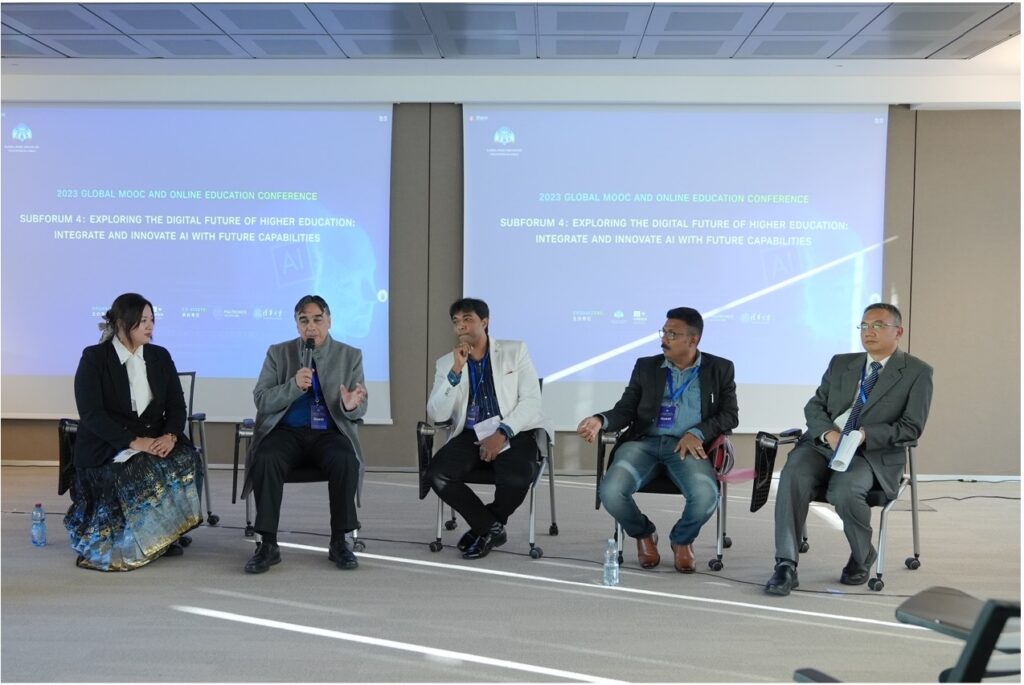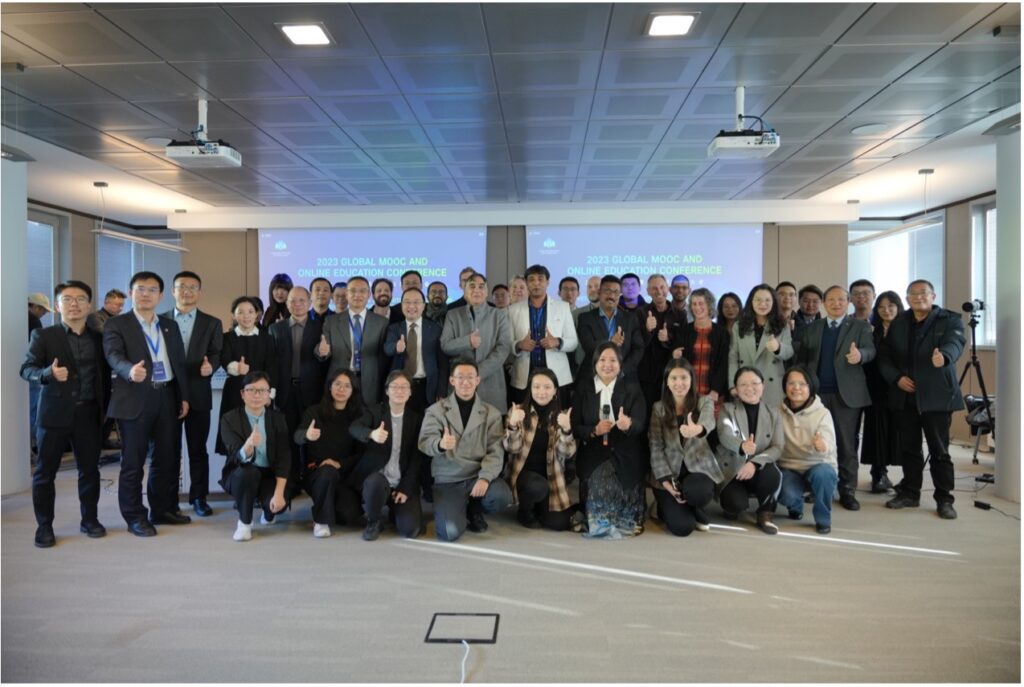On December 16, 2023, from 10:45 to 12:08 Milan time, the fourth sub-forum of the 2023 Global MOOC and Online Education Conference, themed ” Exploring the Digital Future of Higher Education: Integrate and Innovate AI with Future Capabilities” was successfully held. The forum’s attendees engaged in in-depth discussions on the impact of artificial intelligence on the future of education and explored how to reconstruct education and promote the development of teaching and learning in the era of artificial intelligence.
During the keynote speech, Riel Miller, former Head of Literacy at UNESCO, suggested that technology itself cannot drive change; rather, it is human actions and decisions that propel transformation. He emphasized the importance of considering the impact of future education and artificial intelligence, presenting ideas for envisioning future scenarios in higher education. Miller called on individuals to harness agency, engage in proactive thinking and action, and contribute to driving future change.
Sebastian Plate from the Berlin Ellery Studio, pointed out that certain artificial intelligence technologies can potentially bring more risks and challenges to the academic field, necessitating appropriate adjustments and transformations to educational systems. There should be adaptation by teachers and students to the presence of artificial intelligence in education, incorporating reflective learning into the curriculum. Infrastructure and technology serve as the most crucial driving forces for the development of artificial intelligence, and the theoretical construction of AI development should always be rooted in practical processes.
Sun Hua, Director of the Center for Excellence in Teaching and Learning at Peking University, shared Peking University’s educational practices. He believes that in the era of artificial intelligence, education needs continuous reform and innovation to adapt to new technologies and the demands of the times. He introduced a teacher development program in collaboration with Cambridge University (PKUnet), involving AI-driven educational innovation applications and digital tools. Sun emphasized the importance of providing teachers with more opportunities and encouraging their use of artificial intelligence in the classroom. He also shared cases of using AI tools to enhance teaching and supported teachers in conducting scientific research in the field of big data.
Steven Watson, associate professor from the Faculty of Education at Cambridge University, shared insights into Cambridge University’s practices in the digitization of education, such as interdisciplinary collaboration to integrate artificial intelligence technology into curriculum and pedagogy. He discussed the impact of ChatGPT on higher education, addressing how it benefits education without harming the educational system. He also discussed how to manage potential academic integrity issues that may arise from ChatGPT. Watson believes that students need to acquire some foundational technological skills, but it is currently unpredictable what kind of understanding will emerge with the widespread use of ChatGPT. Simultaneously, the challenges and ethical issues brought about by technological development require interdisciplinary collaboration and normative frameworks to address them cohesively.
Bie Dunrong, Dean of the Institute of Education at Xiamen University, analyzed the impact of technological development on education and society, as well as how higher education institutions should respond to these changes. He emphasized that Artificial Intelligence is advancing rapidly, but the number of people mastering this technology is relatively small. Higher education institutions need to conduct in-depth research into the impact of new technologies, represented by artificial intelligence, on education and society. They should also take on more responsibility, utilizing new technologies to meet the educational needs of a broader population. Universities should strengthen communication and collaboration with businesses, understanding changes in workforce demands, and improving curriculum and teaching methods accordingly.
Zachary Pardos, Associate Professor in the School of Education at the University of California, Berkeley, shared the experience of the Computational Approaches to Human Learning Lab (CAHL) on applying AI to advise research. He introduced the course recommender system (AskOski.com) at UC Berkeley. By integrating student interests, attention factors, and ethical considerations, the University of California, Berkeley, uses the ChatGPT recommendation system and automated tutoring system to assist students in course selection and answering questions, achieving notable practical results.
Malte Persike, Head of the Center for Online Education at RWTH Aachen University, explained how to use artificial intelligence to enhance the quality and efficiency of assessments. He used an example from RWTH Aachen University’s MOOC community, where interspersed dynamic assessments in the MOOCs facilitated corrections and grading by students in course development, providing more efficient feedback to students.

Panel discussion session
From left to right: Ruoqi Cao (host), Luis Falcon-Morales, Abhisek Karmakar, Arindam Roy, Li Xiaofeng
During the case study and panel discussion, Luis Falcon-Morales, Adjunct researcher in the School of Engineering and Sciences at Tecnológico de Monterrey, Lavinia Ionica, learning designer at Hochschulforum Digitalisierung, Abhisek Karmakar, Assistant Professor at the University of Burdwan, Arindam Roy, Associate Professor at the University of Burdwan and Li Xiaofeng, Professor in School of Information and Communication Engineering at University of Electronic Science and Technology of China, shared their respective institutions’ experiences in online education and teaching practices. They discussed the advantages of artificial intelligence in promoting online education and blended learning. All attendees drew a consensus that enhancing students’ scientific and innovative thinking during the learning process is the crux of educational development.

Group photo of all guests and staff after sub-forum 4
